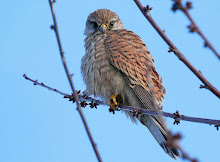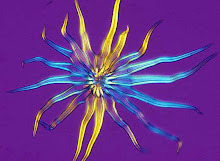Saturday, March 3, 2012
Irrepressible Little Weed
This little annual weed, whitlow grass Erophila verna, is flowering in the cracks between the paving on the edge of the River Tyne, all the way from the Tyne bridge to the mouth of the Ouseburn. Whitlow grass is a winter annual whose seeds germinate in autumn, so that it spends the winter as a tiny green rosette then produces flowers in late winter - sometimes as early as January. By the time spring arrives in earnest its life cycle is over for another year.
Whitlow grass (which is a member of the cabbage family and not a grass at all) is an extremely widespread plant, adapted to habitats that become drought-stricken in summer (like wall tops and sand dunes) by setting seed before water shortage sets in. It's well adapted to city living ....
...... but I think the most unusual habitat that it thrives in is on the top of meadow ants' nests, where a dense covering of its tiny white flowers can look like a cap of snow in late winter. These raised domes of fine soil become very dry by early summer and when the nest is active the vegetation is constantly buried in soil particles bought to the surface by ants - but by then whitlow grass has finished its life cycle and all that remains is its prolific seed output.
Labels:
Erophila verna,
meadow ant,
Newcastle,
Whitlow Grass,
winter annuals
Subscribe to:
Post Comments (Atom)


























Fascinating little plant Phil.
ReplyDeleteI've often wondered what it was; now I know.
I always find this species almost impossible to get a decent picture of, Phil.
ReplyDeleteSo that is what it is called! I have lots of it here between the paving bricks. It has an interesting lifestyle.
ReplyDeleteThere's a whole group of diminutive members of the cabbage family that are common but seem to be overlooked Keith.
ReplyDeleteKnow what you mean Steve - there's a similar problem with other small plants, like pearlwort - you have to get close, and then you run out of depth of focus!
ReplyDeleteI think seeds of several of these small plants that survive in paths must be carried around in feet of animals and people, tofeeapple.....
ReplyDeleteA few years ago this went berserk around parts of the North West along the edges of roads. I 'blamed' it on the salting over the winter but don't know if that really was the cause. It seems to have gone back to normal now.
ReplyDeleteIt's an extremely variable and adaptable little weed, isn't it John? I've see it thriving on sand dunes so I bet you are right about it evolving to colonise saline road verges.
ReplyDelete